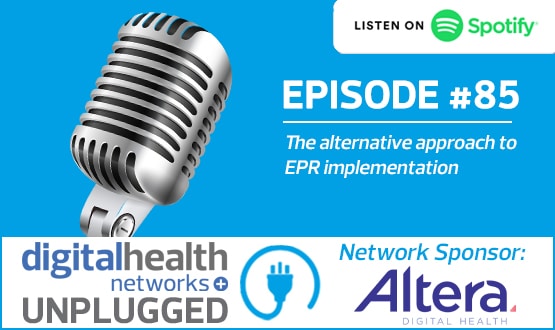Digital innovation must be ‘at heart’ of healthcare reform
- 19 February 2021

Digital innovation must be “at the heart” of healthcare reforms to capitalise on progress made during the Covid-19 pandemic, a policy institute has said.
Public Policy Projects (PPP) called on the government to use digital tools to better enable collaboration across the NHS following the release of the white paper for health and care last week.
The paper aims to embed lessons learned during the Covid-19 pandemic and make legislative changes to reduce red tape within the health service. This includes putting Integrated Care Systems on a statutory footing and relaxing rules around procurement so commissioners would no longer be required to put contracts out to tender.
PPP echoed the need to “galvanise” the progress made during the pandemic in its ‘State of the Nation: Digitisation and Medical Technologies’ report, setting out 12 recommendations focused on driving cultural and practice change towards digital-first healthcare.
The report, written by former associate chief CIO of NHS England Dr Harpreet Sood and Deputy Chair of PPP healthcare and life sciences policy board. Baroness Nicola Blackwood, sets out a long-term vision for the “transformational potential” of digital and data enabled healthcare.
It reflects the views of more than 70 industry leaders and partners including Novartis, Cerner, Cloudgateway, Siemens Healthineers, Nourish Care, and VitalityHealth.
“We need to remove the institutional and systemic barriers in working efficiently for patients and healthcare professionals and improve the widening health inequalities,” Dr Sood said.
“The report calls for healthcare professionals, industry leaders, policymakers and the general public to think and act differently, looking to a future in which population health is empowered by innovative technology and data directs how healthcare is delivered in the 21st century.
“As our population continues to age, the digitisation of the NHS will enable care to be more joined-up and the structures in place to link health and social care to be drastically improved.”
PPP called on Minister for Innovation, Lord Bethell, and CEO of NHS Digital, Sarah Wilkinson, to look towards tech-based solutions for a number issues facing the NHS, including:
- Placing digital innovation at the heart of healthcare reform
- Implementing a prevention-first approach
- Empowering patients to become informed co-creators of their own health
- Legislating better data access, interoperability and protection
- Reviewing effective digital solutions used during the pandemic
Data and insight will form the “bloodstream” of a digitally enabled health and care system, the report said, calling for a review of current data frameworks to inform the forthcoming Data Strategy for Health and Care.
The strategy was announced by health secretary Matt Hancock in November 2020 as part of his ‘bureaucracy-busting mission’. Dr Ben Goldacre has been appointed to look into how health data for research and analysis can be used efficiently and safely ahead of the strategy.
Other recommendations made in the PPP report include embedding the NHS App more widely to “unleash” the potential of personal health data; reinforcing a culture on innovation and collaboration across NHS and government bodies; and implementing training standards to develop digital skills.
The government should “sufficiently fund” ICS digital transformation to support proposals set out in the white paper, including discretionary funding to “level up” systems falling behind, the report states.
Baroness Blackwood said: “The rapid expansion of new forms of system collaboration, and remote care experienced during the pandemic has heightened the need to rethink both the ambitions and plans for the digital and medical technologies agenda.
“The government will only be successful in its aims to enhance the current structure of the NHS, provide clear lines of accountability, and integrate health and care services if it ensures that digital innovation is at the centre of all health and social care reforms moving forward.
“The Department for Health and Social Care must build on the momentum generated over the course of the pandemic to drive substantive culture and practice change towards digital-first healthcare provision which is more proactive, predictive, and effective.”
The white paper
The government’s white paper will “modernise the legal framework” to make the health system “fit for the future”, according to a Department of Health and Social Care statement.
The plans follow health secretary Matt Hancock’s ‘bureaucracy-busting mission’, which aims to improve the use of data within the NHS and would see the health service capitalise on “good practice” responses during Covid-19.
These new proposals would see integrated care become the default and would enable the NHS to use technology in a modern way to support staff and patient care, including improving quality and availability of data, the DHSC said.
They would also see the health secretary gain greater control over objectives for the NHS and greater control over NHS England, while the NHS and local authorities would gain greater flexibility to decide who provides healthcare services.
Leaders of the Digital Health Networks said the plans provide “real opportunity” for digital leaders to shape the future of healthcare, while suppliers warned interoperability should not come at the cost of “transparent” procurement.
We are the hosts of Digital Health Rewired 2021, the must-attend virtual festival celebrating the best of digital health and care, taking place across 15-19 March 2021. Get a flavour of Rewired 2021 from the video below. You can book your place here





1 Comments
Personally, I have a definite preference for living on a planet that does not contain any of the people mentioned in this article. We should be very afraid if they are seen as a source of wisdom. A human being is not an aggregation of data.
Anyone who listened to Sarah Wilkinson giving evidence to the Parliamentary Select Committee on Health, chaired by Dr Sarah Wollaston, in 2018, on the subject of a certain Memorandum of Understanding between NHS Digital and the Home Office, will be very afraid seeing her name again. We all should.
Comments are closed.